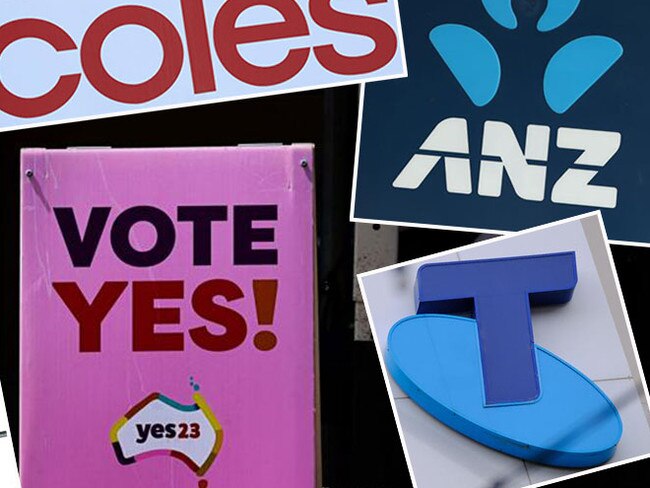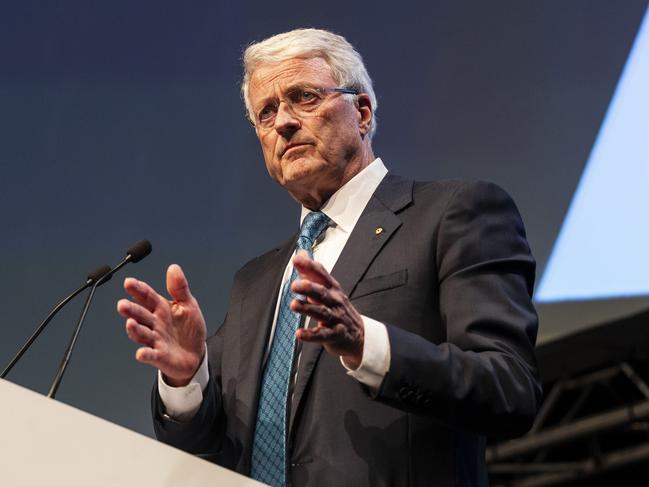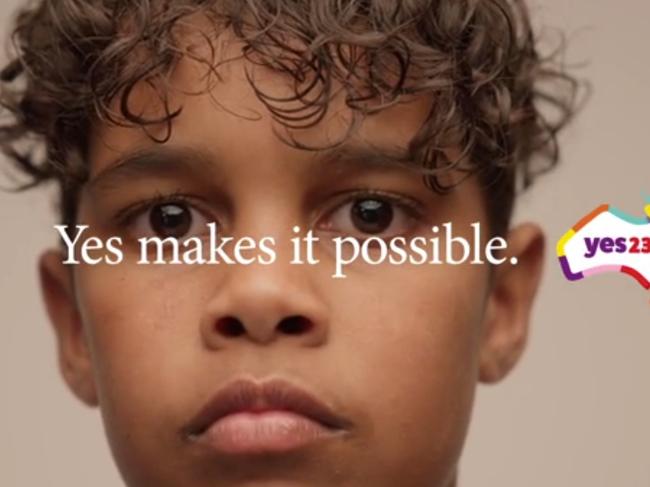Vikki Campion: Cost of the Voice? We need a price check on virtue signalling
Big corporates and their bosses have spent plenty flexing muscle and money on the Yes vote, but is their money on the ground really where their mouth is, asks VIKKI CAMPION.
Opinion
Don't miss out on the headlines from Opinion. Followed categories will be added to My News.
Across Australia, we have copped a charade of corporate virtue, flexing financial muscle on marketing for the Yes camp.
It’s the ultimate statement of ego that you can enforce your enlightened view on your staff and customers, the ignorant masses, because of your position as a company CEO.
We are not your subjects, but one thing the Voice has amplified is how one person paid millions of dollars gets the right to direct his employees how to think, harking back to semi-feudalism where the man in the big castle tells the peasant the laws they live by.
Throughout history, big governments and big corporations have had a bad habit of enforcing their political views on staff, as they believe they are not a corporation, but a shining light of inspiration from the senior management view.
But corporations have confused themselves with churches, where they proffer moral authority over their shoppers, shareholders and checkout operators.

Like a lot of religions, their philosophy doesn’t line up with their actions.
If only some of the major banks that have been so enthused about promoting the Voice had been as happy to keep their branches open in some 700 regional towns that have lost them over the past few years.
Such as the NAB, which hosts pro-Voice videos with Yes campaigner Thomas Mayo on its website, while simultaneously shutting regional Wiradjuri-speaking communities out of essential financial services.
Last Thursday, the NAB closed at Temora, leaving customers with an 86km each-way trip, with no public transport, to get to the bank at Wagga.
While the NAB has announced 29 regional closures this year because it says customers are banking online, the 2023 Australian Digital Inclusion report found that Indigenous people in remote communities often have “extremely limited access to digital infrastructure and services and … very high costs for internet”.
Suppose your priority as a bank was ensuring equality for Aboriginal people – who the 2021 Census tells us mostly live in regional and remote areas – then why would you ask them to go online when studies into digital inclusion show they cannot?

Whether they are elderly, speak English as a second or third language, or live in a mobile blackspot, there are vulnerable and marginalised people who cannot use and will not have access to a smartphone or internet.
The NAB representatives told a Senate inquiry into regional banking this year that it would “visit 46 remote Indigenous communities four times a year so they can have some face-to-face contact with bankers”.
ANZ representatives, at the same inquiry, were “unable to comment” when asked if they would bring back regional branches on the direction of the Voice, should the Yes campaign that it supported win.
The local hardware store doesn’t tell what your position should be on the Voice – yet the same people who come to Parliament and tell lawmakers they have nothing to worry about when it comes to excessive market power, do.
It’s peculiar that Coles and Woolworths moralise on the Voice, before selling alcohol and cigarettes, along with Telstra, which won’t allow roaming to switch between providers on a single tower, in regional areas where Indigenous people live, which could bring phone costs down.
MIND THE GAP
There is no greater gap than in the mums at the giant green Bunnings sheds hosting charity sausage sizzles and the Wesfarmers board.
Wesfarmers gave $2m to the Yes campaign’s PR girls while spruiking its donations to Aboriginal opera – “Australia’s first work of musical theatre developed in Indigenous language” in Western Australia.
None of the 403,904 Wesfarmers shareholders, who hold between 1 to 1000 shares, were asked about their views on the Voice before Wesfarmers CEO Michael Chaney became director of Australians for Indigenous Constitutional Recognition Ltd and Bunnings and Kmart began being used as a tool for changing the constitution.
Wesfarmers generated $43.7bn this 22-23 financial year, and its spending with Aboriginal and Torres Strait Islander businesses totalled $47.5m. If 1 per cent of their turnover is $430m, Wesfarmers spent about 10 per cent of 1 per cent of their turnover on Indigenous suppliers and calls it a win. Of that, how much was spent on T-shirts, buttons and lanyards with the word “yes” on them?
The company spruiks that of their 120,000 employees, 3689 Aboriginal, about 100 were put in an Indigenous Leadership Program, and “almost a quarter of these team members achieving promotion or an expansion in responsibilities”.

With Chaney’s corporate might and access to the leadership in his various roles, including on the National School Resourcing Board, perhaps Wesfarmers representatives could go to Bunnings and Kmart in Alice Springs and listen to the bus drivers who step over unconscious uncles to wake up five-year-olds on a mattress and carry them to the bus.
Or the school cook who spends her own wages feeding kids, knowing their breakfast on Monday will be their first meal since she last fed them on Friday. Or the teachers who let students sleep in class, knowing they have been up all night to keep safe.
Instead, Wesfarmers money went into the $35m corporate slush bucket, which put a little boy on television, to look down to the camera and ask: “Will I get to go to a good school?”
If the CEOs had put their millions into elders’ wishes for Indigenous boarding schools and scholarships so kids were safe, the answer could have been yes. So let’s call it for what it is – a virtue bandaid on a pretty nasty scab.
Disclosure: Vikki Campion is a shareholder or trustee shareholder of Wesfarmers, ANZ, NAB and Coles
More Coverage
Originally published as Vikki Campion: Cost of the Voice? We need a price check on virtue signalling





